|
|
|
Sort Order |
|
|
|
Items / Page
|
|
|
|
|
|
|
| Srl | Item |
| 1 |
ID:
137226
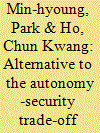

|
|
|
|
|
| Summary/Abstract |
Most of the alliances that were formed during the Cold War period were known as a so-called “asymmetric alliance,” which means strong states provide one-sided support for the partner in a relationship at the expense of the weaker power’s autonomy. In an asymmetric alliance, a weak state gets full security support from the superpower, but in return, the weak state loses its autonomy. In this case, there is a trade-off between security and autonomy of the weaker state. This is what the Autonomy-Security Trade-off Model suggests. However, after the end of the Cold War, the weak powers, especially the developing country, have tried to increase its autonomy without any loss of its security—unlike what the Autonomy-Security Trade-Off Model argues. In this case, there may not be necessarily a trade-off between autonomy and security if a weak state decides to increase both autonomy and security simultaneously. The weak state does not usually want to lose its security, therefore it tries to find a strategy that can increase its autonomy without decreasing its security. In this sense, this paper argues that the Autonomy-Security Trade-off model has limitations to explain the above kind of national action after the Cold War. In line with this, the goal of this paper is to offer an alternative model to explain an asymmetric alliance relationship by looking at the case of the
ROK-U.S. alliance at the turn of the twenty-first century.
|
|
|
|
|
|
|
|
|
|
|
|
|
|
|
|
| 2 |
ID:
125260
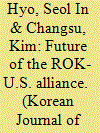

|
|
|
|
|
| Publication |
2013.
|
| Summary/Abstract |
Over the past six decades, the alliance between the Republic of Korea and the United States has become one of the most successful military alliances in history. Numerous strategic changes are anticipated in Northeast Asia over the coming years, including the risk of a military attack by North Korea and a shift in the balance of power. Among multiple factors that contribute to the success of an alliance, one key factor is sharing a common vision of the future since sharing this is crucial to enhance the trust shared today and to reinforce the alliance's capability to respond effectively to any new challenges that may arise. This paper seeks to offer a vision for the ROK-U.S. alliance and make suggestions on how the alliance can develop and improve in the future by trying to forecast changes in the security circumstances surrounding the Korean Peninsula and Northeast Asia until around 2030. As a result, this paper finds the fact that maintaining the ROK-U.S. alliance is the optimal choice for both countries until 2030, despite the various strategic changes in Northeast Asia, including a possible national reunification of the Korean Peninsula and presents a long-term vision for the ROK-U.S. alliance based on this fact and some implementation strategies for this vision.
|
|
|
|
|
|
|
|
|
|
|
|
|
|
|
|
| 3 |
ID:
142090
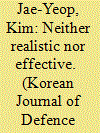

|
|
|
|
|
| Summary/Abstract |
This paper examines the logics and problems of U.S. nuclear weapon redeployment demands among the general public in the Republic of Korea (ROK) to cope with the nuclear threat from the Democratic People’s Republic of Korea (DPRK). Proponents of the idea believe that redeploying U.S. nuclear weapons on ROK soil will help to restore the military balance on the Korean Peninsula and strengthen strategic options for denuclearization efforts. However, U.S. nuclear weapon redeployment is not only contradictory to defense policy of both the ROK and the United States, but also not so effective in terms of both military and diplomatic aspects. The ROK and U.S. governments should seek and carry out more practical policy alternatives to deter military challenges from a nuclear-armed North Korea and revitalize efforts for denuclearization of the Korean Peninsula, rather than resorting to the illusion of U.S. nuclear weapon redeployment.
|
|
|
|
|
|
|
|
|
|
|
|
|
|
|
|
| 4 |
ID:
145480
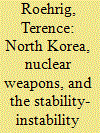

|
|
|
|
|
| Summary/Abstract |
As the chances wane of North Korea relinquishing its nuclear weapons, how will this capability affect its behavior and tolerance of risk? Increasingly, scholars are using the Cold War concept of a stability-instability paradox to describe the possibility of Pyongyang being more willing to tolerate risk and conduct increased numbers of lower-level provocations under the cover of nuclear weapons. North Korea has long been tolerant of accepting a great deal of risk prior to its acquisition of nuclear weapons, and it is not clear if nuclear weapons have increased that tolerance––or as some have argued, it may actually decrease North Korea’s risk tolerance, making it more cautious. While North Korea’s rhetorical barrages in recent years have exceeded past outbursts, and weapons testing has done a great deal to rattle nerves, much of this can be viewed as part of its deterrence-posturing and less of the more aggressive, status quo-altering actions predicted by the stability-instability paradox.
|
|
|
|
|
|
|
|
|
|
|
|
|
|
|
|
| 5 |
ID:
125255
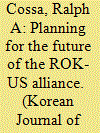

|
|
|
|
|
| Publication |
2013.
|
| Summary/Abstract |
Although it is hard to predict how and when the Korean Peninsula will finally become reunited, there is no doubt that the best means to ensure peace on the Korean Peninsula is through maintaining a strong ROK-U.S. alliance, both today and after reunification. A new approach with a midterm goal of peaceful coexistence is needed to keep Pyongyang positively engaged and to set the stage for eventual
Reunification and denuclearization. While Washington may take the lead in dealing with the nuclear issue, Seoul must take the lead in Korean Peninsula reunification. The U.S. and ROK must agree upon and then jointly articulate their respective roles and missions and begin making the case today for a role for the alliance post-reunification. For the denuclearization and the non-proliferation message to be kept firm, maintaining a strong ROK-U.S. alliance is critically essential.
|
|
|
|
|
|
|
|
|
|
|
|
|
|
|
|
| 6 |
ID:
125264
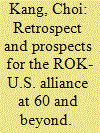

|
|
|
|
|
| Publication |
2013.
|
| Summary/Abstract |
The year 2013 marks the 60th anniversary of the ROK-U.S. alliance. The catchphrase "We go together," which is used in the ROK/U.S. Combined Forces Command (CFC), well captures its founding spirit. Since the beginning of the alliance, with the signing of the ROK-U.S. Mutual Defense Treaty in 1953, it has been a key element in both countries' security strategies. Both have agreed to upgrade the alliance to "strategic alliance." To realize a strategic alliance, clear guidelines that go beyond simple rhetoric must be adopted and an action plan devised through intense discussions. For that purpose, it is essential for South Korea and the United States to undergo a bottom-up review process of the alliance. It is important to pay careful attention to: identification of challenges the two must cope with together (for what); the division of labor (who should do what); plans and strategy (how); and cooperation mechanisms (through what). Along these lines, it is important to think about how to enrich the contents of military cooperation as the backbone of the alliance. To avoid any misunderstanding and over-expectations of the United States, South Korea must make it clear what it can and cannot do on the basis of undiminished mutual respect.
|
|
|
|
|
|
|
|
|
|
|
|
|
|
|
|
|
|
|
|
|